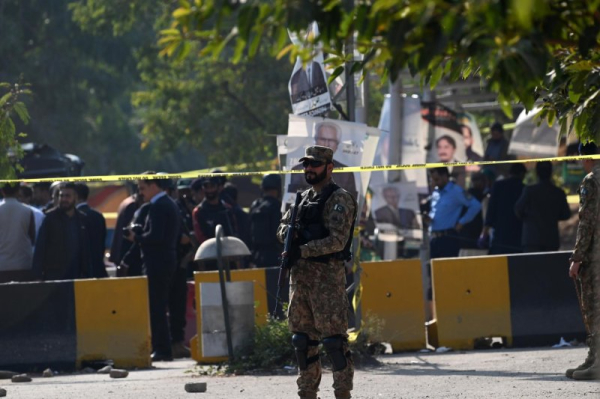

Security officials secure the site after a suicide bomb blast outside the judicial complex in Islamabad, Pakistan, on Tuesday. Photo by Sohail Shahzad/EPA
An explosion Tuesday outside a court building in Islamabad killed at least 12 people, security forces said, adding that they’re investigating the incident as a suicide attack.
The car bomb detonated Tuesday afternoon in the parking lot of the district and sessions court building, officials told Dawn News. The location of the car bomb was near the entrance to the court complex.
Along with the dead, at least 36 people sustained injuries, said Dr. Mubahshir Daha, spokesperson for the Pakistan Institute of Medical Sciences.
“Following the attack, an emergency has been declared at PIMS, and medical assistance to the injured is underway. All resources are being utilized to assist the injured.”
Daha told Dawn News that of the 36 people transported to the hospital, doctors discharged 18, 14 were admitted, 3 were in the emergency department and 1 person was in surgery.
No group has claimed responsibility for the attack, but an unnamed security source told CNN that Afghanistan and India were involved.
Pakistani Prime Minister Shehbaz Sharif blamed India for the blast as well as another attack Tuesday on a cadet college, Al Jazeera reported. He provided no evidence as to why he blamed India.
“Both attacks are the worst examples of Indian state terrorism in the region,” he said in a post on X.
“It is time for the world to condemn such nefarious conspiracies of India. We will continue the war against them until the complete elimination of the scourge of terrorism.”
An attack on the heart of Pakistan’s capital is relatively unusual as most violence in the country is typically confined to the more remote border regions. While Sharif placed the blame on India, Pakistani Defense Minister Khawaja Asim pointed west toward Afghanistan.
“We are in a state of war,” Asim said in a post on X.
“Anyone who thinks that the Pakistan army is fighting this war in the Afghan-Pakistan border region and the remote areas of Baluchistan should take today’s suicide attack at the Islamabad district courts as a wake-up call: This is a war for all of Pakistan, in which the Pakistan army is giving daily sacrifices and making the people feel secure.
“In this environment, it would be futile to hold out greater hope for successful negotiations with the rulers of Kabul.”
Iftikhar Firdous, a security analyst, told Al Jazeera that the war between Pakistan and Afghanistan extends beyond just the countries’ shared border.
“These are no coincidences. The day the Taliban refused to give up the TPP and [Afghan Foreign Minister Amir Khan] Muttaqi signed a joint statement with [Indian External Affairs Minister Subrahmanyam] Jaishankar to protect India’s security interests in Afghanistan, the age of new proxy wars began,” he said.
TTP, or Tehrik-i Taliban Pakistan, is also known as the Pakistani Taliban. The militant group has pledged allegiance to the Taliban, which has ruled Afghanistan since 2021, and waged violence against Shiite Muslims in Pakistan. Among the TTP’s targets are Pakistan’s military and government, which the group seeks to overflow in favor of an Islamic state.
The Pakistani government has taken issue with what it says is the Afghan government’s support of TTP militants.
Violence between Pakistan and Afghanistan has steadily increased since the Taliban took over the Afghan government in 2021 and ramped up further in October after the Taliban accused Pakistan of carrying out airstrikes in Kabul. For its part, Pakistan accused the Afghan Taliban of instigating the violence.
Cease-fire talks between the two countries fell apart last week.